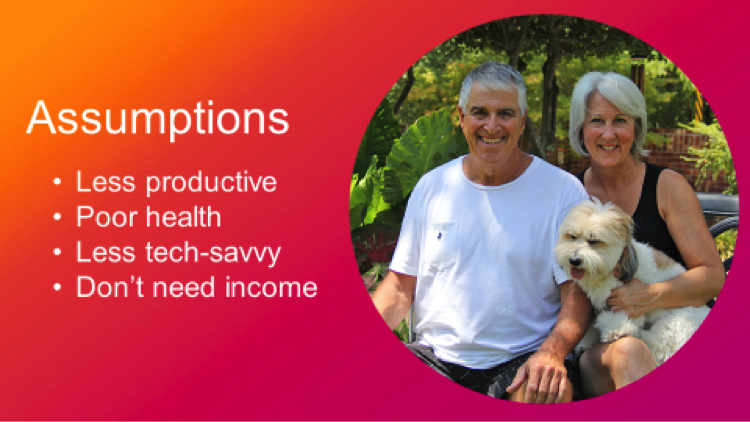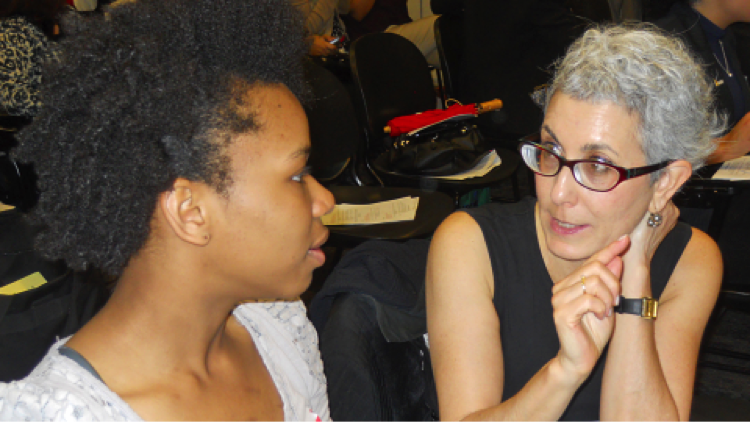I recently left a good job because I wanted to do a different kind of work. Though I am circling sixty, I was surprised when people asked “are you retiring?” No, I’m looking ahead to a new challenge. As a woman and a Baby Boomer, I’ve worked throughout my life. My goal has always been to find satisfaction in what I do. Like most everyone I know, I support myself and I’d like to do it working at something that is an extension of my interests, skills and values. So far, so good. But now that I, and thousands of fellow Boomers, are reaching the “traditional retirement age” each day in Minnesota, long-held assumptions (and perhaps prejudices) that older adults should leave the workforce when they turn 60, 62 or 65 are in my face.
Yet, research is dispelling these preconceived notions:

Older workers are less productive.
Minnesota’s workforce, with 21% of workers aged 55+, is one of the most productive in the nation. It is the highest educated workforce ever. Older workers are shown to have a strong work ethic, deep base of experience and skills and fewer personal obligations or distractions.
Older workers experience poor health.
Over 62% of Minnesota adults 65+ report “no chronic conditions or illnesses.” Projected longevity for my generation keeps rising; a person now 65 can expect to live to 84. While most of us won’t do 60-hour work weeks for the next 19 years, we can continue productive employment past 65.
Older adults aren’t tech-savvy.
Boomers were introduced to computers in the 80s. We’ve worked with rapidly-changing systems for 30 years. Older workers enthusiastically adopt technology because it keeps them connected to extended family as well as to their jobs.
Older workers don’t need to work for an income.
This is laughable—and not true. The lack of adequate savings, coupled with extended longevity and unstable economic conditions help maintain a high level of anxiety about financial security among everyone I know including much younger workers.(Conversely, continuing paid work allows ongoing social security investment into the Social Security fund and an 8% yearly increase in Social Security benefits if not taken until after age 70).
Older workers are creating intergenerational conflict.
Minnesota is experiencing a labor shortage and needs workers at every point of the demographic curve. Boomers and Millennials occupy two “tails” of the current workforce curve—both segments want more flexibility, ongoing income and sense of belonging. Passing on Boomer skills through deliberate mentoring of younger workers could soften the impact of people like me gradually leaving the workplace.
Important, intangible benefit

Continuing to work provides personal satisfaction, a sense of belonging and of contributing to something larger than ourselves. Numerous studies assert living a life of purpose (identified as having a strong sense of meaning, which frequently comes from essential paid employment and/or volunteer work) as “highly conducive to reducing one’s susceptibility to stroke, dementia, movement problems, disability, and premature death.” No matter the setting, being connected and feeling productive has proven a powerful antidote to feelings of loneliness and uselessness.
Change of plan

For some workers, stopping paid work at 65 is a dream come true—it’s time to fish 24/7 or become really involved with grandchildren. For others, it’s a necessity because of conditions outside their control, such as family demands or personal illness.
The good news is, me and my age cohort have choices, as summarized by a recent survey from AARP:
- 45% of respondents said they plan to retire sometime between 65 and 70
- 37% say they plan to work for pay in retirement
- 73% of respondents plan to work part time
- Almost half of those surveyed are looking to work in a new field, as traditional employees or as independent contractors (gig economy?)
- 19% look forward to starting their own businesses
We older workers can continue to exercise our capabilities and contribute to the workforce while we move through our sixth and seventh and eighth decades of life. It’s a different way of thinking so it can be scary. Our challenge is to check our own mindset, to talk with each other AND HAVE CONVERSATIONS with our employers about what we “want” to do. Revive old hopes and dreams and see how they could fit our current reality. Ongoing education over the next few years? Exploring an intriguing field in which we may or may not excel? Volunteering for a mission which fits our passions at 70?
Over my working career, I’ve left six excellent positions I look for new challenge, engagement and satisfaction. Do I feel ready to stop? No. Today, I’m exploring how to work on a long-time interest, workforce development–for mature workers. I’d like to help change the dialogue around traditional retirement age. Do I have to stop? Hope not.